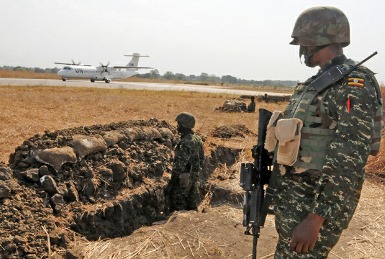Ugandan army won’t take part in cluster bomb investigation: spokesperson
February 19, 2014 (KAMPALA) -The Ugandan army says it will not take part in an investigation in to the use of cluster bombs in South Sudan.

“I think it is the government of South Sudan together with other agencies who are involved but we are not part of them,” said Ankunda when asked whether Uganda will participate in investigations into the origins of the bombs.
Cluster bombs remnants were discovered by a UN de-mining team earlier this month on a section of road near the Jonglei state capital, Bor.
The strategic town was the scene was heavy fighting, changing hands several times during the conflict, which erupted in the capital Juba on 15 December before spreading to other parts of the country.
According to the UN Mine Action Service (UNMAS), the site was contaminated with the remnants of up to eight cluster bombs and an unknown quantity of bomblets.
The Ugandan army has denied that it forces ever used cluster bombs during the conflict in South Sudan.
However, rebel forces have accused the UPDF of conducting air attacks on their positions, which they say is evidence of the use of ammunitions.
Ankunda had admitted the UPDF carried out aerial attacks, but maintains no cluster bombs were used.
“We don’t have cluster bombs … and we have not used them anywhere. Let them investigate, they should be able to find out where these clusters bomb came from and who uses them,” he said.
Cluster bombs are banned worldwide due to the danger they pose to human life long after a conflict has ended. Once launched, they eject smaller explosive bomblets over a large area, but many fail to detonate at the time, becoming de-facto landmines.
Human Rights Watch (HRW) last week called on the South Sudanese government and its allies to launch an immediate investigation into the use of the banned ammunitions.
The New York-based advocacy group said in its report there was “serious and credible evidence” to suggest cluster bombs had been used.
Human rights activists in South Sudan have urged the international community and the government to form an independent body to head the investigation.
South Sudan has denied stockpiling the ammunitions and is widely believed not to possess the capacity to manufacture bombs. Activists have seized on this as further evidence the bombs came from outside the country.
Remnants of cluster bombs were discovered in northern Uganda, where the military fought a protracted war with the rebel Lord’s Resistance Army (LRA).
Uganda denied using the ammunitions then too, saying LRA rebels were responsible.
The Ugandan army’s deployment to South Sudan, which is providing military support to government troops, is threatening to derail peace talks, with rebels this week maintaining their calls for an immediate withdrawal.
(ST)
